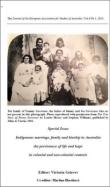 8112150484453725763.jpg
8112150484453725763.jpg
 8112150484453725763.jpg
8112150484453725763.jpg
We are Survivors'is a raw and clear-eyed portrayal of the circumstances facing Tasmanian Aborigines in the post World War II years and the forces which shaped their emerging political activism.' (Source: Australianplays.org)
'This paper suggests that the current depictions of Aboriginal families must be contextualised within an understanding of the complex historical relationships that continue to be marked by both a culture of fear and also a failure to appreciate the alternative narratives on Aboriginal families that are extant with Aboriginal communities themselves.' (Source: Abstract)
'This paper describes selected key events in the life of Coolibah, a retired Gurindji stockman, through his non-Aboriginal friend John Boulton.' (Source: abstract)
'Taking a reflexive and auto-ethnographic approach, this article explores the unique process of transcultural adoption by which Aboriginal people have selectively extended their family formations to include as well as "manage" outsiders.' (Source: abstract)
'Call Me Mum adds to a growing collective of films that depict indigenous [sic] women, cross-cultural relations and family dynamics in interesting and complex ways. This article uses the idea of a “genderslide” (a misquotation of genocide by one of the main characters) to explain the influence that the three strong but deeply flawed lead female characters in this film have on their son/grandson, as well as the impact of Call Me Mumon viewers. It is the conceptual spaces that constitute the idea of family that I argue are re-shaped by this conflicted depiction of intimate black/white, mother/child relations in Australia.' (Source: abstract)
'The interviewing of Aboriginal people about their family history, that is, about their relatives, on radio proved to be an innovation that provides a “snapshot” of a person’s history and identity. Interviews such as these can become more precious over time. This is the case with Aunty June Barker’s interview on BlakChat a program on Koori Radio and the Gadigal Information Service in Sydney, that is reproduced below. The exact reproduction of this interview in text provides an opportunity to explore Aboriginal English expression and sentiment, proof of cultural continuity amongst the Aboriginal people of southeast Australia,as well as hearing a unique and important story of one family’s history.'
Source: Abstract.
'Stephen Kinnane’s Shadow Lines (2003) pertains to the genre of Indigenous
inter-generational life writing in which the younger generation of Indigenous writers substitutes white editors in recording the lives and memories of their own families and community elders, thus seizing a greater amount of control over the representations of Australian Indigenetiy. Kinnane extends the genre by appropriating the tools of colonial domination, most notably the archive, and by inscribing, in a self-reflective way, his own subjectivity in the text. As a result,Shadow Lines is a multilayered narrative that presents a functional and ontented interracial marriage and family life of Kinnane’s grandparents, as a wayof counteracting the close regulation and policing of Aboriginality in the early twentieth-century Western Australia. In addition,Kinnane juxtaposes the archival materials to other sources of information, mostly the orally transmitted memories of relatives and friends, thus reclaiming the agency of his ancestors and providing a truthful representation of their lives and the lives of the local Indigenous community.' (Source: abstract)
'A descendent of the O’Brien family, closely related to those who suffered tragic
irretrievable loss at the hands of Jimmy Governor when he murdered a pregnant women and her toddler child in 1900, recounts her family’s journey of reconciliation. The sight of the “posts in a paddock”, the remains of the original homestead in which the deaths occurred and the only disappearing reminder of this tragedy on what is still the family farm near Wollar, north-east of Mudgee NSW, moved the author to explore the stories from her family and also from the Governor family. This realization took her on a journey to gather up, and introduce to each other, members of both families and to workshop their stories as a means of seeking a resolution to the tragedy. This journey eventually came to include descendants of Jimmy and Ethel Governor and led to reconciliation through participation in the development and performance of a play. The final outcome is a theatre piece marked by interracial collaboration and establishing common ground through intercultural dialogue,understanding and an overriding shared wish for reconciliation.' (Source: abstract)